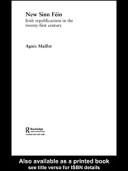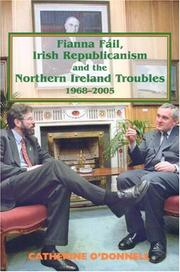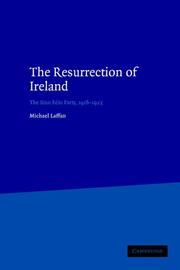| Listing 1 - 9 of 9 |
Sort by
|
Book
ISBN: 1849642893 9781849642897 9780745324630 0745324630 9780745324623 0745324622 Year: 2009 Publisher: London New York, NY Pluto Press
Abstract | Keywords | Export | Availability | Bookmark
 Loading...
Loading...Choose an application
- Reference Manager
- EndNote
- RefWorks (Direct export to RefWorks)
Sinn Fein is a growing force in Irish politics. Now the country's third largest party, Sinn Fein have been one of the central architects of the peace process and are increasingly setting the terms of political debate in Ireland north and south. Despite this, the party remains much misunderstood and often misrepresented. Sinn Fein and The Politics of Left Republicanism explores the ideological and organisational origins of the party, charts their history and recent political development and assesses their possible futures. Eoin O Broin argues that Sinn Fein is part of a distinct left-republican tradition in Irish society whose future lies in the globally resurgent radical democratic left.
Republicanism --- Political science --- History --- Sinn Fein --- Sinn Fein the Workers' Party --- Shin Feĭn --- SF --- Ċoṁairle Náisiúnta (Ireland) --- National Council (Ireland) --- Chomhairle Naisiunta (Ireland) --- History. --- Ireland --- Politics and government --- Républicanisme --- Histoire --- Irlande --- Politique et gouvernement

ISBN: 0203338766 1280055235 1134355017 0203299698 9780203299692 9781134354962 9781134355006 9781134355013 9780415321969 9780415321976 1134355009 Year: 2005 Publisher: New York Routledge
Abstract | Keywords | Export | Availability | Bookmark
 Loading...
Loading...Choose an application
- Reference Manager
- EndNote
- RefWorks (Direct export to RefWorks)
As a consequence of Sinn Féin's connection with the IRA, the military side of the republican movement has tended to overshadow the political, both in terms of its internal operation and strategic choices and in terms of the attention that it has attracted from scholars, writers and journalists. However, since the 1998 Good Friday Agreement, Sinn Féin has experienced substantial growth, in terms of electoral results and party support, both in Northern Ireland and in the Republic of Ireland.This book assesses the importance and relevance of Sinn Féin within the changing configurations of
Political parties --- Peace movements --- Nationalism --- History. --- Sinn Fein. --- Sinn Fein the Workers' Party --- Shin Feĭn --- SF --- Ċoṁairle Náisiúnta (Ireland) --- National Council (Ireland) --- Chomhairle Naisiunta (Ireland) --- Northern Ireland --- Politics and government
Book
ISBN: 1283377721 9786613377722 1843317648 1843318598 Year: 2010 Publisher: London : Anthem Press,
Abstract | Keywords | Export | Availability | Bookmark
 Loading...
Loading...Choose an application
- Reference Manager
- EndNote
- RefWorks (Direct export to RefWorks)
'P.S. O'Hegarty (1879-1955)' provides an informative and lively biography of the Irish nationalist P.S. O'Hegarty, a major historical figure in the modern separatist movement.
Nationalists --- Fenians --- O'Hegarty, P. S. --- O'Hegarty, Patrick Sarsfield, --- Political and social views. --- Sinn Fein --- Gaelic League (Ireland) --- Irish Republican Brotherhood --- Fenian Brotherhood --- Clan-na-Gael --- Conradh na Gaeilge (Ireland) --- Shin Feĭn --- SF --- Ċoṁairle Náisiúnta (Ireland) --- National Council (Ireland) --- Chomhairle Naisiunta (Ireland) --- Sinn Fein the Workers' Party --- Ireland --- History --- Autonomy and independence movements. --- Politics and government

ISBN: 9780716533603 9780716528593 Year: 2007 Publisher: Dublin ; Portland, OR : Irish Academic Press,
Abstract | Keywords | Export | Availability | Bookmark
 Loading...
Loading...Choose an application
- Reference Manager
- EndNote
- RefWorks (Direct export to RefWorks)
Political parties --- Partis politiques --- History --- Histoire --- Fianna Fãil --- Ireland --- Northern Ireland --- Irlande --- Irlande du Nord --- Politics and government --- Politique et gouvernement --- #SBIB:328H2153 --- Instellingen en beleid: Ierland --- Fianna Fáil --- Parties, Political --- Party systems, Political --- Political party systems --- Political science --- Divided government --- Intra-party disagreements (Political parties) --- Political conventions --- Sinn Fein --- Shin Feĭn --- SF --- Ċoṁairle Náisiúnta (Ireland) --- National Council (Ireland) --- Chomhairle Naisiunta (Ireland) --- Sinn Fein the Workers' Party --- Republican Party (Ireland) --- History.
Book
ISBN: 0191876860 0192578340 0192578359 Year: 2020 Publisher: Oxford, England : Oxford University Press,
Abstract | Keywords | Export | Availability | Bookmark
 Loading...
Loading...Choose an application
- Reference Manager
- EndNote
- RefWorks (Direct export to RefWorks)
'Negotiating a Settlement in Northern Ireland' uses original material from witness seminars, elite interviews, and archive documents to explore the shape taken by the Irish peace process, and in particular to analyse the manner in which successful stages of this were negotiated. Northern Ireland's Good Friday Agreement of 1998 marked the end a 30-year conflict that had witnessed more than 3,000 deaths, thousands of injuries, catastrophic societal damage, and large-scale economic dislocation. This book traces the roots of the Agreement over the decades, stretching back to the Sunningdale conference of 1973 and extending up to at least the St Andrews Agreement of 2006.
Violence --- Conflict management --- Peace-building --- Northern Ireland --- Politics and government. --- Building peace --- Peacebuilding --- Peace --- Peacekeeping forces --- Conflict control --- Conflict resolution --- Dispute settlement --- Management of conflict --- Managing conflict --- Management --- Negotiation --- Problem solving --- Social conflict --- Crisis management --- Sinn Fein --- Ulster Unionist Party --- Ulster Party --- Shin Feĭn --- SF --- Ċoṁairle Náisiúnta (Ireland) --- National Council (Ireland) --- Chomhairle Naisiunta (Ireland) --- Sinn Fein the Workers' Party --- History --- Great Britain --- Ireland --- Irish Free State --- G.N.I. --- GNI --- Irlande du Nord --- Kita Airurando --- Kitairurando --- Nordirland --- Norlin Airlann --- Pohjois-Irlanti --- Severna Irlandii︠a︡ --- Tuaisceart Éireann --- 北アイルランド --- Politics and government --- Foreign relations --- Peace negotiations --- Politicians --- Statesmen

ISBN: 110711697X 0511007175 1280161981 1139106848 0511117566 0511149662 0511324510 0511052170 9780511007170 0511036949 9780511036941 9780511117565 9781139106849 0521650739 9780521650731 9780511149665 9786610161980 6610161984 9781280161988 9780511324512 9780511052170 9780521672672 0521672678 Year: 1999 Publisher: Cambridge, UK New York, N.Y. Cambridge University Press
Abstract | Keywords | Export | Availability | Bookmark
 Loading...
Loading...Choose an application
- Reference Manager
- EndNote
- RefWorks (Direct export to RefWorks)
Between 1916 and 1923 Ireland experienced a political, as well as a military revolution. This book examines how, after the Easter Rising of 1916, radical revolutionaries formed a precarious coalition with (relatively) moderate politicians, and offers a sustained analysis of the political organisation of Irish republicanism during a crucial period. The new Sinn Féin party routed its enemies, co-operated uneasily with the underground Irish government, which it had helped to create, and achieved most of its objectives before disintegrating in 1922. Its rapid collapse should not distract from its achievements - in particular its role in 'democratising' the Irish revolution. Its successors have dominated the political life of independent Ireland. The book studies in detail the party's membership and ideology, and also its often tense relationship with the Irish Republican Army. A final chapter examines the fluctuating careers of the later Sinn Féin parties throughout the rest of the twentieth century.
Political parties --- Revolutionaries --- Nationalism --- Revolutionists --- Dissenters --- Counterrevolutionaries --- Parties, Political --- Party systems, Political --- Political party systems --- Political science --- Divided government --- Intra-party disagreements (Political parties) --- Political conventions --- History --- History. --- Sinn Fein. --- Irish Republican Army --- Irish Volunteers --- Provisional IRA --- Armata repubblicana irlandese --- Armée républicaine irlandaise --- I.R.A. --- IRA --- Official IRA --- Oglaig na h-Éireann --- Sinn Fein the Workers' Party --- Shin Feĭn --- SF --- Ċoṁairle Náisiúnta (Ireland) --- National Council (Ireland) --- Chomhairle Naisiunta (Ireland) --- Ireland --- Politics and government --- 20th century --- Sinn Fein --- Arts and Humanities
Book
ISBN: 1781700060 1847794173 9781847794178 9781781700068 9780719084720 0719084725 Year: 2011 Publisher: Manchester Manchester University Press
Abstract | Keywords | Export | Availability | Bookmark
 Loading...
Loading...Choose an application
- Reference Manager
- EndNote
- RefWorks (Direct export to RefWorks)
While there have been many books written about the IRA since 1916, comparatively little attention has been paid to the organisation during the 1960's, despite the fact that the internal divisions culminating in the 1969 split are often seen as key to the conflict which erupted that year. This book rederesses that vacuum and through an exhaustive survey of internal and official sources, as well as interviews with key IRA members, provides a unique and fascinating insight into radical Republican politics which will be of interest to those interested in Irish history and politics. The author looks a...
Political violence --- Republicanism --- Political science --- History --- Irisch-Republikanische Armee. --- Sinn Fein --- Irish Republican Army --- Sinn Fein the Workers' Party --- Shin Feĭn --- SF --- Ċoṁairle Náisiúnta (Ireland) --- National Council (Ireland) --- Chomhairle Naisiunta (Ireland) --- Irish Volunteers --- Provisional IRA --- Armata repubblicana irlandese --- Armée républicaine irlandaise --- I.R.A. --- IRA --- Official IRA --- Oglaig na h-Éireann --- History. --- Geschichte 1956-1969. --- Northern Ireland --- Ireland --- G.N.I. --- GNI --- Irlande du Nord --- Kita Airurando --- Kitairurando --- Nordirland --- Norlin Airlann --- Pohjois-Irlanti --- Severna Irlandii︠a︡ --- Tuaisceart Éireann --- 北アイルランド --- Politics and government --- 1969. --- Irish Republican Army. --- Troubles. --- armed struggle. --- conflict. --- electoral participation. --- internal divisions. --- politics. --- revolutionary movement. --- socialism.
Book
ISBN: 1474420567 1474420559 1474445144 9781474445146 9781474420556 9781474420549 9781474420563 1474420540 9781474420549 Year: 2018 Publisher: Edinburgh
Abstract | Keywords | Export | Availability | Bookmark
 Loading...
Loading...Choose an application
- Reference Manager
- EndNote
- RefWorks (Direct export to RefWorks)
Matthew Whiting explores Irish republicanism's transformation from violence to political power. He examines their electoral participation and engagement in democratic bargaining, the role of Irish-America and British government policy to argue that moderation was a long-term process of concessions in return for increased political inclusion.
Irish Republican Army. --- Sinn Fein. --- Sinn Fein the Workers' Party --- Shin Feĭn --- SF --- Ċoṁairle Náisiúnta (Ireland) --- National Council (Ireland) --- Chomhairle Naisiunta (Ireland) --- Northern Ireland --- Ireland --- Irish Free State --- G.N.I. --- GNI --- Irlande du Nord --- Kita Airurando --- Kitairurando --- Nordirland --- Norlin Airlann --- Pohjois-Irlanti --- Severna Irlandii︠a︡ --- Tuaisceart Éireann --- 北アイルランド --- Politics and government --- Political violence --- History. --- Sinn Fein --- Irish Republican Army --- Violence --- Political crimes and offenses --- Terrorism --- Armata repubblicana irlandese --- Armée républicaine irlandaise --- I.R.A. --- IRA --- Official IRA --- Oglaig na h-Éireann --- Irish Volunteers --- Provisional IRA
Book
ISBN: 1526102781 1781706085 9781781706084 9781526102782 9780719082061 0719082064 1526122839 152610279X Year: 2013 Publisher: Manchester New York
Abstract | Keywords | Export | Availability | Bookmark
 Loading...
Loading...Choose an application
- Reference Manager
- EndNote
- RefWorks (Direct export to RefWorks)
Combining the latest scholarship and academic research with current debates, 'Direct Democracy' is essential reading for political scientists, lawyers, journalists and anybody who is interested in the challenges facing democracies today. It shows when government by the people can improve democratic governance.
Direct democracy. --- Referendum. --- Comparative government. --- Comparative political systems --- Comparative politics --- Government, Comparative --- Political systems, Comparative --- Political science --- Ballot initiatives --- Ballot measures --- Initiative and referendum --- Initiatives, Ballot --- Propositions (Referendum) --- Referenda --- Referendums --- Democracy --- Elections --- Representative government and representation --- Direct democracy --- Plebiscite --- Direct legislation --- Referendum --- Great Britain. --- Democratic Unionist Party (Northern Ireland) --- Sinn Fein. --- Social Democratic and Labour Party (Northern Ireland) --- Ulster Unionist Party. --- Northern Ireland Act 1998 (Great Britain) --- Since 1994 --- Northern Ireland --- Northern Ireland. --- Politics and government --- Ulster Party --- SDLP --- Chomhairle Naisiunta (Ireland) --- Ċoṁairle Náisiúnta (Ireland) --- National Council (Ireland) --- SF --- Shin Feĭn --- Sinn Fein the Workers' Party --- DUP --- Ulster Democratic Unionist Party --- D.U.P.N.I. --- Act to make new provision for the government of Northern Ireland for the purpose of implementing the agreement reached at multi-party talks on Northern Ireland set out in Command Paper 3883 (Great Britain) --- G.N.I. --- GNI --- Irlande du Nord --- Kita Airurando --- Kitairurando --- Nordirland --- Norlin Airlann --- Pohjois-Irlanti --- Severna Irlandii͡ --- Tuaisceart Éireann --- Direct Democracy. --- The Legislative Initiative. --- The Recall.
| Listing 1 - 9 of 9 |
Sort by
|

 Search
Search Feedback
Feedback About UniCat
About UniCat  Help
Help News
News